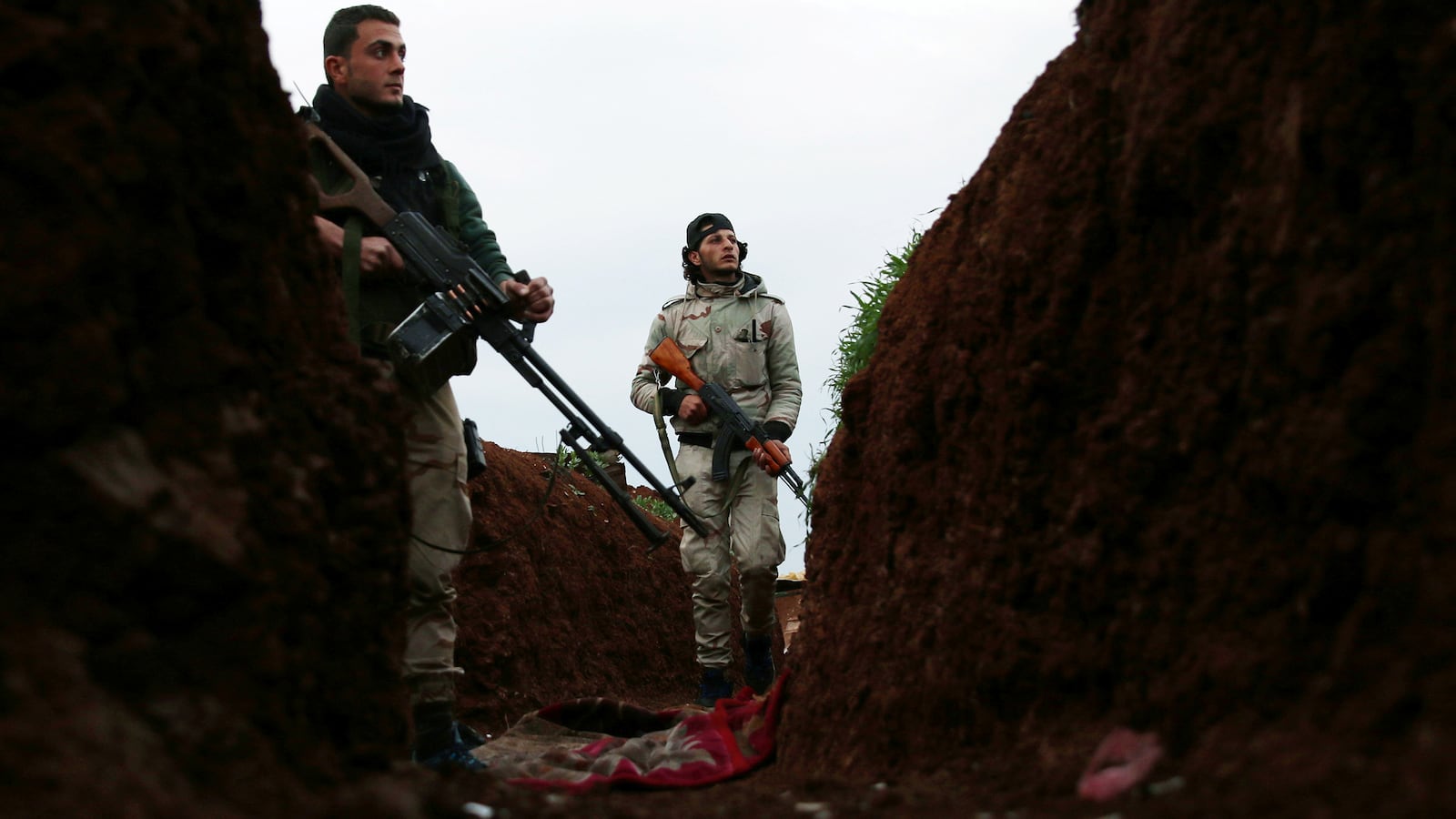ISTANBUL—As moderate rebel groups in Syria tried to digest the news that the U.S. will soon cease all covert support for them—a sudden revelation they learned from press reports—northern Syria descended into further chaos.
As The Daily Beast reported Wednesday, American troops on the ground have been put at risk by Turkish reports of their numbers and their precise whereabouts. Now the very existence of moderate local forces backed by the U.S. hangs in the balance.
Some 15,000-plus rebel troops in northern Syria have been receiving CIA support for the past four years. But four commanders told The Daily Beast they had learned of the aid cutoff from news reports. They said they had feared something was afoot when they didn’t receive their salaries in July.
Critics of U.S. President Donald Trump were tempted to draw a parallel with the way he stiffed contractors and employees as a businessman, but in Syria this is deadly serious business:
Radical jihadists in an umbrella group with alleged ties to al Qaeda have just grabbed big swaths of territory in Idlib province and threatened to close the border with Turkey, a step that could lead to a Turkish military intervention.
The soon-to-be-ditched U.S.-backed forces were not directly involved in the fighting in Idlib, Aleppo, and Hama provinces. But they could play—or could have played—a military role against the al-Qaeda-allied group formerly known as Jabhat al Nusra, which has ousted a somewhat more moderate Islamist group, Ahrar al Sham, from most of Idlib province.
A commander of the Izza Army in Hama province, one of the five major rebel groups on the covert aid payroll, said his organization had no idea what would happen now because all they knew was from the news media.
An officer who asked to be identified only as Lt. Mahmoud Al Mahmoud, said the force of more than 3,300 hadn’t received salaries for July, which were due 10 days ago. Fighters are paid $125 a month.
"Islamist groups have different sources of support,” he said. “They are in control of border crossings and some of them have oil wells under their control, while the FSA depends wholly on outside support. If this support stops, the FSA will be greatly weakened."
Mahmoud said that there are 13 rebel groups getting covert support in the north, deployed in the provinces of Latakia, Aleppo, Idlib and Hama.
Col. Muataz Raslan of the Nukhba Army, with 2,750 fighters, said officers and fighters hadn’t been informed officially of the aid cutoff. Major Samer Aliwi, deputy commander of Nasr Army, the biggest FSA group in the north of Syria, with 3,600 fighters, said his group had been assured of their salaries this month, but he had no idea what will happen in August.
A fourth commander, who asked to remain anonymous, told The Daily Beast U.S. officials had not said anything about a cut-off of aid or what would follow.
One Syrian opposition news agency reported an unnamed rebel commander saying that U.S. support will continue for a few months and then move to a new mechanism. The commander added that the U.S. is pressuring rebels to unify under a joint military command before resuming support.
There is also the possibility that Turkey and Qatar would fill the breach. Both have supported both moderate rebel groups as well as Ahrar al Sham, which has Salafist origins but now portrays itself as moderate.
Meanwhile, in the latest crisis in northern Syria, the al-Qaeda affiliated group now known by the initials HTS (for Hayat Tahrir al Sham) advanced from the east toward the Bab al Hawa border gate with Turkey.
Activists posted pictures of fires that erupted in some camps for the internally displaced due to indiscriminate shelling of the warring groups.
The manager of the public relations office for HTS told Enab Baladi, a local news outlet, that the fighting is focusing now in the outskirts of the border gate.
Ahrar al Sham spokesperson Muhammad Abu Zaid said severe clashes are taking place in the city of Sarmada, the biggest town on the border with Turkey, which HTS captured from Ahrar al Sham.
But HTS may have overextended itself. In a major setback Nuruddin al Zinki, a major component of HTS in western Aleppo, announced it had quit the umbrella group because of the infighting with Ahrar al Sham.
The latest round of infighting began Tuesday across Idlib province—now home to 3 million people, at least half of them internally displaced. It stretched from Khan Sheikhoun, the town in the south of Idlib province which the Assad regime attacked with chemical weapons in April, to Sarmada on the Turkish border.
HTS apparently intends to capture the entire province, but the issue has not yet been decided. Ahrar al Sham, backed by Turkey, moved 200 fighters from the Jarablus pocket, a part of Syria now under Turkish control, to the Bab Al Hawa border gate, and Ahrar al Sham said the Zinki movement also had sent fighters to defend the border area, which Ahrar al Sham now controls.






